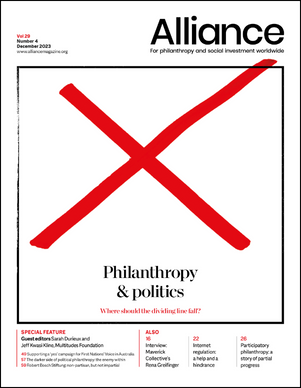Internet regulation can assist the work of social change movements – but it can also be used to hinder it
Philanthropy is a critical player in the rapidly evolving digital landscape. As the challenges and opportunities presented by internet regulation become increasingly evident, Latin America offers a unique lens through which to view this nexus.
Brazil: navigating murky waters
Brazil’s recent adoption of the General Data Protection Law (LGPD) was initially hailed as a significant step towards safeguarding individual privacy in the digital age. Modelled after the EU’s General Data Protection Regulation (GDPR), the LGPD aims to give individuals more control over their data.
However, initially under the Bolsonaro administration, the waters have become murkier. While the law was designed to protect individual data, it has been implemented in ways that have put pressure on civil society. For instance, climate change organisations rely on data collection to monitor environmental changes and mobilise communities. The government has questioned their data collection methods, suggesting they infringed individual privacy rights.
An example is the case of small environmental NGOs working in the Amazonian forest. After launching a campaign highlighting deforestation, they suddenly faced a government-led audit. The authorities demanded detailed records of their data collection practices, citing concerns under the LGPD. While the organisations maintained their practices were transparent and within legal bounds, the audit drained their resources and diverted their focus from core environmental initiatives.
Are protective internet laws being weaponised against civil society? How can organisations navigate these challenges without compromising their mission?
By providing resources and fostering collaborations between grantees and internet regulation experts, philanthropic institutions can help navigate these policy challenges.
The regulatory mosaic of Chile, Colombia, and Argentina
Chile grapples with the challenge of curbing misinformation without quelling freedom of expression. Colombia’s focus on data localisation poses operational challenges, especially for organisations with a global footprint. Argentina’s new data protection project, which stands out as a ‘low cost’ GDPR-like regulation, has serious issues around who will enforce the law, budget restrictions and lack of transparency regarding the scope of some critical articles of the proposed bill.
It has become obvious from these regulatory discussions that governments and regulators are not distinguishing between ‘big tech’ platforms and social change organisations using
technology for positive impact. In this scenario, philanthropy must support digital rights and tech-oriented organisations to equip them with tools and public policy strategies to advocate for regulations that create the necessary safeguards for NGOs to continue deploying their programmes without excessive oversight and auditing.
At Civic Compass, our recent publication, Civic Participation Platforms and Content Regulation, focused precisely on this. The insights from this research underscore the pressing need for nuanced regulations that differentiate between commercial tech giants and mission-driven platforms, particularly in the muddy waters of platforms’ content moderation policies.
Electoral processes
Another critical issue for global philanthropy is dealing with the intricacies of electoral processes in the digital age. As 2024 – dubbed the global ‘Year of Elections’ – approaches, the spotlight on the impact of digital campaigns intensifies. Some of our research delves into digital campaigning: on the one hand, it offers unprecedented reach and engagement, but on the other, it poses challenges regarding misinformation, data privacy and transparency. The regulatory landscape further complicates matters: a lack of policies can lead to a ‘wild west’ of digital campaigning. Conversely, excessive regulation might stifle genuine outreach efforts, hindering NGOs from effectively disseminating crucial information to increase the transparency of elections in those regions where institutions are weak.
By joining forces with other entities, the voice and influence of philanthropy can be amplified, leading to a more significant impact.
This is where global philanthropy can play a transformative role. By providing resources and fostering collaborations between grantees and internet regulation experts, philanthropic institutions can help navigate these policy challenges. Their support can empower NGOs working to uphold electoral transparency and the rule of law, ensuring that work isn’t hampered by the digital and regulatory environment. Furthermore, philanthropy can champion the cause of informed digital regulation, bridging the gap between policymakers and grassroots organisations.
Regulation and the digital terrain
In a digital realm that is in constant flux, philanthropic institutions must stay informed and offer timely support. Advocacy, while powerful, needs to be approached with nuance, ensuring it is both knowledgeable and balanced.
Social change organisations have a distinct opportunity to deepen their understanding of public policy and regulations, positioning themselves as critical actors vis-a-vis policymakers. This potential is realised when these organisations recognise their influential role in shaping policy landscapes. To support this vision, we introduced POLIS, a training programme centred on public policy advocacy designed to enhance the capabilities of organisations in Latin America.
Furthermore, there is immense value in collaboration. By joining forces with other entities, the voice and influence of philanthropy can be amplified, leading to a more significant impact.
As we reflect on our role in this landscape, several questions arise. How can we, as philanthropic entities, ensure that regulations meant to protect don’t inadvertently become barriers? Are we considering the unique digital challenges faced by the organisations we support? And, crucially, are we being proactive in our approach or merely reacting to the shifts in the digital landscape?
Social change organisations and their donors are coming late to the discussion table. The interplay between philanthropy and internet regulation is complex due to the need for updated information about what is being discussed between regulators and policymakers. As we navigate this digital age, drawing insights from regions like Latin America and research initiatives like Civic Compass can provide valuable guidance. The journey ahead is one of understanding, advocacy, and collaboration, filled with challenges and opportunities.
Gaston Wright is director of Civic Compass, a programme of Civic House.
Email: gaston@civic.house
X: @wrightgas





Comments (0)
Simulation games offer insights into complex systems and real-world scenarios.
buckshot roulette online is a first-person horror game
Thank you for giving this crucial knowledge. Your webpage is excellent. I'm intrigued by what's given on this page. If you want to play with me, come on over. Playing pico park in your spare time is a terrific way to unwind after a demanding workday.